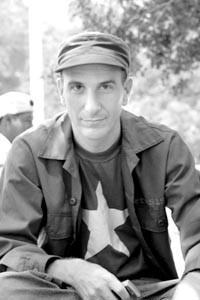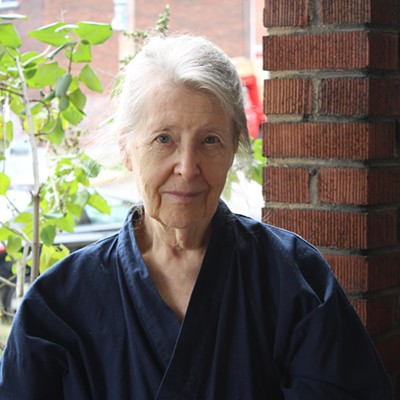Jordan Flaherty is a community organizer and journalist whose new book is Floodlines: Community and Resistance from Katrina to the Jena Six (Haymarket Books). He writes at Left Turn: Notes from the Global Intifada. He spoke with CP about the book, his time working in New Orleans, and the state of journalism.
Are you from New Orleans originally?
No. I lived in New Orleans about eight years. I used to work as a community organizer and I was in New Orleans when Katrina hit, and what I saw was really a transformative experience for me. Unfortunately, [I saw] the way a lot of the survivors were treated on evacuation -- going through evacuee camps, National Guard soldiers pointing guns at them and there being very little aid for people, families getting separated, taken on buses to Oklahoma, Arkansas, Houston. I wrote about what I'd seen and that was forwarded all around, translated into several languages. A lot of community organizers from New Orleans and around the country who I respected encouraged me to keep doing this, and that's how I began writing about the post-Katrina period in New Orleans.
Did you have experience as a writer before that?
That was really the beginning. I'd written a few pieces here and there, but definitely did not consider myself a writer before that time.
When you started it was basically on-the-spot reporting; you didn't plan to write a book?
Yeah, definitely not. I was just trying to get out these stories. There's been so much reporting from New Orleans from this period, so many books, but I really just haven't seen anything that's focused on this aspect of things: community organizing and grassroots responses. It really seems like there was a vacuum.
Why didn't the mainstream press pick up on this part of the story?
I think in general in this country and maybe in the rest of the world to some extent, there's this great-man theory of history: The civil-rights movement is about Martin Luther King and Kennedy and Johnson. It's a few of these movers, and the more complex stories that talk about these people at the grassroots who don't want the headlines, who are just doing the hard work, often don't get told.
I think part of it is the way our dominant narrative in this country is often shaped by film: To make a powerful film, you need one central protagonist. It's hard to do a film with multiple protagonists. I think [Wayne] Schoenfeld and a couple others have done that, but in general you need that one protagonist. I think we're used to our narrative being told in that way.
How did you end up finding the people whose stories came out in this book?
This was really the community I came from -- the grassroots community in New Orleans. These are people I've been working with and collaborating with for the better part of ten years. I've seen them at work, seen them do incredible, inspiring work.
For example, I talk about a law that targets prostitutes in the city, where they're charged as sex offenders under a law that was designed for child molesters -- they have "sex offender" printed on their driver's license, they have to mail out post cards to everyone in their neighborhood saying they're sex offenders. This story I heard about because of people who were organizing around this issue, and it hadn't really been covered in the media.
The Jena Six case was another that I heard about from local activists who were working on the case; no one else had written about it before, other than the local newspaper there. But I heard about it because of people who were doing this work, writing and talking about it.
Do you feel like there's a gap between the kind of communities you're working with and most of the mainstream press? A serious structural problem? Is there a solution you advocate?
I do think there are structural problems. There's not an easy solution, but I think the fact that our media is part of this profit model is a major problem. It's ultimately about advertising dollars, and I think that media is a basic need like health care and education and housing, in a way. We need it to make our society function. And the more all of those things shift toward a profit model, the worse off we all are.
I think media's definitely in crisis in this country. Magazines and newspapers are folding left and right. The newsrooms are getting cut back almost everywhere; the model of Fox News seems to be successful and therefore is replicated.
There are some great folks working on local media. But an example of how it really failed in the post-Katrina period is that you had an editor with the local paper, the Times-Picayune, who, after Katrina, stumbled upon a scene where he saw a group of officers standing above the bodies of two black men on the ground -- he assumed they were dead -- and the officers grabbed his notebook and chased him away. And he never wrote that story. We had a staffer with a daily paper stumble on the incident and he only wrote about it almost four years later, when the investigations started to come out. But he was silent all that time. It's such an indictment of our local media that that happened.
Correction/clarification: After this story was published, Jordan Flaherty acknowledged that the Times-Picayune journalist whose notebook was seized by police, Gordon Russell, did in fact note the encounter in a story written shortly afterward. (Police returned Russell’s notebook, and a camera taken from a photographer who was also at the scene, after a brief period.) Russell’s encounter was also discussed in a New York Times account at the time, and he later testified about it in a federal civil-rights case, which concerned allegations that New Orleans police had a practice of threatening or arresting citizens who observe or record police conduct.
What was the most surprising thing that you found when you were working on these stories?
I'm often a cynical person, and I don't have a lot of illusions about, for example, the role of police in New Orleans. But I kept being surprised that these stories I'd hear kept turning out to be true.
When I first heard after Katrina that there were officers on the major bridge outside of New Orleans firing on people, keeping people from evacuating from the city, I just couldn't believe it; to find out that that was true was incredible. And to hear about this Danziger Bridge incident, heading east from New Orleans, where officers killed two and wounded four and planted evidence, invented witnesses, had secret meetings where they conspired to get their story straight -- that that ended up being true as well was just incredible. It's something where, in a film or a fiction story you might not believe it.
But I've also been amazed at how people at the grassroots have fought and have come back with very little federal support. The fact that hundreds of thousands of people have come back to New Orleans with very little help from the government, and the fact that communities have brought people back and these brass bands and social aid and pleasure clubs -- these community institutions -- have been able to come back against such incredible odds is a testament to the power of the grassroots of the city, and really worth celebrating.
Jordan Flaherty speaks as part of the Community & Resistance Tour, also featuring activist Jesse Muhammad and writer/photographer Victoria Law. 7 p.m. Sat., Sept. 18, Shadow Lounge, 5972 Baum Blvd., East Liberty. 412-363-8277.














